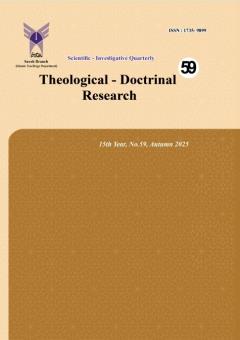Criticism of Dawkins' View on the Relationship between Science and Religion by Approach of Philosophical Kālām of Imamiyyā
Subject Areas : Islamic theology
Samad Behrouz
1
,
gorbanali karimzadeh garamaleki
2
,
Asad Mahdioun Herab
3
![]()
1 -
2 - Faculty Member of Tabriz University associate professor, Department of Philosophy and Kalam
3 - Notaries Association
Keywords: Dawkins, Religion, Science, Relationship between Science and Religion, Philosophical Kālām.,
Abstract :
By denying God and religion and considering them as illusions, Dawkins claims that religious faith is a blind truth and a kind of mental illness and an accidental product of a kind of deviation in a useful matter; therefore, religion is in conflict with science and has a virus-like opposition and prevents its progress. In this research, her perspective has been criticized and examined using an analytical and descriptive method, and in library studies it has been clarified. However, according to philosophical kālām of Imamiyyā discourse, contrary to Dawkins' view, believes that science and religion are not only not contradictory, but the truth of religion, unlike Dawkins, originates from the pure institution of man and is based on rational and unbreakable principles, and its relationship with science is distinct in some areas and complementary in some cases and interactive in some cases. Also, from the perspective of philosophical kālām of Imamiyyā, if empirical science is viewed as absolute and certainty, it will be a harmful error to the extent of denying God and will cause the collapse of the principles of human ethics and virtues.
ابن عساکر، علی بن حسن، (1415ق)،تاریخ مدینه دمشق، بیروت:دارالفکر.
احمد الحسن، وهم الإلحاد، آيات الربوبیة فی الكون، ناشر: نجمة الصباح، بغداد.
باربور، ایان، (1392). دین و علم، (مترجم:پیروز فطورچی) تهران: پژوهشگاه فرهنگ و اندیشه اسلامی.
دراز، محمد عبدالله، (1378) مدخلیبرکاوشدرتاریخ ادیان، ترجمه سید محمدباقر حجتی، تهران:دفترنشر فرهنگ اسلامی.
ری شهری، محمد، (1375) میزان الحکمه، قم: دارالحدیث.
سروش، عبدالکریم، (1379) علم چیست؟فلسفه چیست؟تهران:موسسه فرهنگی صراط.
جوادی آملی، عبدالله، (1372) شریعت درآینه معرفت، ناشر:مرکز فرهنگی رجاء.
جوادی آملی، عبدالله، (1386) منزلت عقل در هندسه معرفت دینی , قم، اسراء.
دهخدا، علی اکبر، (1377) لغت نامه، ج10، تهران:دانشگاه تهران.
الطریحی النجفی، فخرالدین، مجمع البحرین.
طباطبایی، محمد حسین، (1378) شیعه در اسلام، قم، ناشر:دفترانتشارات اسلامی.
طباطبایی،محمدحسین، (1390) المیزان فی تفسیرالقرآن، ج1 ، بیروت:موسسة الاعلمی للمطبوعات.
طباطبایی، محمدحسین، (1415ق) بدایه الحکم ه، قم : موسسه النشر الاسلامی التابعه لجماعه المدرسین.
فراهیدی، خلیل بن احمد. (1410ق) العین، قم:هجرت.
کلینى، محمد بن یعقوب، (1407ق) الکافی، تهران، دار الکتب الإسلامیة، چاپ چهارم.
کلینی، محمد بن یعقوب، (1375) ترجمه اصولکافی، محمد باقر کمره ای، قم.
مصطفی ملکیان، (1379) تاریخ فلسفه غرب، قم، پژوهشکده حوزه و دانشگاه.
مطهری، مرتضی، (1376) مقدمهای برجهان بینی اسلامی، در مجموعه آثار، جلد 2 تهران:صدرا.
هات، جان. اف، (1385) علم و دین، ازتعارض تا گفتگو، مترجم بتول نجفی، تهران:انتشارات طه.
هیوم، رابرت. (1389) ادیان زنده جهان. ترجمهعبدالرحیم گواهی. تهران: علم.
Dawkins, Richard, (1986), The Blind Watchmaker: Why The Evidence Of Evolution Reveals A Universe Without Design
, Dawkins, Richard, (1996), The Blind Watchmaker: Why The Evidence Of Evolution Reveals A Universe Without Design, New York, Norton
Evans, J. H. & Evans, M. S. (2008). Religion and science: Beyond the epistemological conflict narrative. Annual Review of Sociology, (34), pp.87-105
Worrall, J. (2002). Science Discredits Religion (M. L. Peterson & R.J. Van Arragon, Eds.). Contemporary Debates in Philosophy of Religion. Oxford Blackwell


